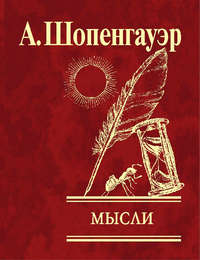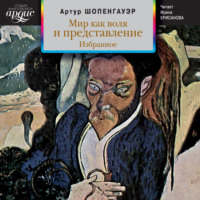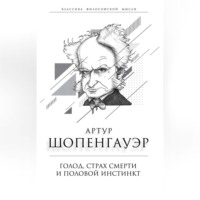 полная версия
полная версияThe World as Will and Idea (Vol. 2 of 3)
The cases in which a thought or a picture of the fancy suddenly came into our mind without any conscious occasion seem to afford an exception to what has been said. Yet this is for the most part an illusion, which rests on the fact that the occasion was so trifling and the thought itself so vivid and interesting, that the former is instantly driven out of consciousness. Yet sometimes the cause of such an instantaneous appearance of an idea may be an internal physical impression either of the parts of the brain on each other or of the organic nervous system upon the brain.
In general our internal process of thought is in reality not so simple as the theory of it; for here it is involved in many ways. To make the matter clear to our imagination, let us compare our consciousness to a sheet of water of some depth. Then the distinctly conscious thoughts are merely the surface; while, on the other hand, the indistinct thoughts, the feelings, the after sensation of perceptions and of experience generally, mingled with the special disposition of our own will, which is the kernel of our being, is the mass of the water. Now the mass of the whole consciousness is more or less, in proportion to the intellectual activity, in constant motion, and what rise to the surface, in consequence of this, are the clear pictures of the fancy or the distinct, conscious thoughts expressed in words and the resolves of the will. The whole process of our thought and purpose seldom lies on the surface, that is, consists in a combination of distinctly thought judgments; although we strive against this in order that we may be able to explain our thought to ourselves and others. But ordinarily it is in the obscure depths of the mind that the rumination of the materials received from without takes place, through which they are worked up into thoughts; and it goes on almost as unconsciously as the conversion of nourishment into the humours and substance of the body. Hence it is that we can often give no account of the origin of our deepest thoughts. They are the birth of our mysterious inner life. Judgments, thoughts, purposes, rise from out that deep unexpectedly and to our own surprise. A letter brings us unlooked-for and important news, in consequence of which our thoughts and motives are disordered; we get rid of the matter for the present, and think no more about it; but next day, or on the third or fourth day after, the whole situation sometimes stands distinctly before us, with what we have to do in the circumstances. Consciousness is the mere surface of our mind, of which, as of the earth, we do not know the inside, but only the crust.
But in the last instance, or in the secret of our inner being, what sets in activity the association of thought itself, the laws of which were set forth above, is the will, which urges its servant the intellect, according to the measure of its powers, to link thought to thought, to recall the similar, the contemporaneous, to recognise reasons and consequents. For it is to the interest of the will that, in general, one should think, so that one may be well equipped for all cases that may arise. Therefore the form of the principle of sufficient reason which governs the association of thoughts and keeps it active is ultimately the law of motivation. For that which rules the sensorium, and determines it to follow the analogy or other association of thoughts in this or that direction, is the will of the thinking subject. Now just as here the laws of the connection of ideas subsist only upon the basis of the will, so also in the real world the causal connection of bodies really subsists only upon the basis of the will, which manifests itself in the phenomena of this world. On this account the explanation from causes is never absolute and exhaustive, but leads back to forces of nature as their condition, and the inner being of the latter is just the will as thing in itself. In saying this, however, I have certainly anticipated the following book.
But because now the outward (sensible) occasions of the presence of our ideas, just as well as the inner occasions (those of association), and both independently of each other, constantly affect the consciousness, there arise from this the frequent interruptions of our course of thought, which introduce a certain cutting up and confusion of our thinking. This belongs to its imperfections which cannot be explained away, and which we shall now consider in a separate chapter.
Chapter XV. On The Essential Imperfections Of The Intellect
Our self-consciousness has not space but only time as its form, and therefore we do not think in three dimensions, as we perceive, but only in one, thus in a line, without breadth or depth. This is the source of the greatest of the essential imperfections of our intellect. We can know all things only in succession, and can become conscious of only one at a time, indeed even of this one only under the condition that for the time we forget everything else, thus are absolutely unconscious of everything else, so that for the time it ceases to exist as far as we are concerned. In respect of this quality our intellect may be compared to a telescope with a very narrow field of vision; just because our consciousness is not stationary but fleeting. The intellect apprehends only successively, and in order to grasp one thing must let another go, retaining nothing but traces of it, which are ever becoming weaker. The thought which is vividly present to me now must after a little while have escaped me altogether; and if a good night's sleep intervene, it may be that I shall never find it again, unless it is connected with my personal interests, that is, with my will, which always commands the field.
Upon this imperfection of the intellect depends the disconnected and often fragmentary nature of our course of thought, which I have already touched on at the close of last chapter; and from this again arises the unavoidable distraction of our thinking. Sometimes external impressions of sense throng in upon it, disturbing and interrupting it, forcing different kinds of things upon it every moment; sometimes one thought draws in another by the bond of association, and is now itself dislodged by it; sometimes, lastly, the intellect itself is not capable of fixing itself very long and continuously at a time upon one thought, but as the eye when it gazes long at one object is soon unable to see it any more distinctly, because the outlines run into each other and become confused, until finally all is obscure, so through long-continued reflection upon one subject our thinking also is gradually confused, becomes dull, and ends in complete stupor. Therefore after a certain time, which varies with the individual, we must for the present give up every meditation or deliberation which has had the fortune to remain undisturbed, but yet has not been brought to an end, even if it concerns a matter which is most important and pertinent to us; and we must dismiss from our consciousness the subject which interests us so much, however heavily our anxiety about it may weigh upon us, in order to occupy ourselves now with insignificant and indifferent things. During this time that important subject no longer exists for us; it is like the heat in cold water, latent. If now we resume it again at another time, we approach it like a new thing, with which we become acquainted anew, although more quickly, and the agreeable or disagreeable impression of it is also produced anew upon our will. We ourselves, however, do not come back quite unchanged. For with the physical composition of the humours and tension of the nerves, which constantly changes with the hours, days, and years, our mood and point of view also changes. Moreover, the different kinds of ideas which have been there in the meantime have left an echo behind them, the tone of which influences the ideas which follow. Therefore the same thing appears to us at different times, in the morning, in the evening, at mid-day, or on another day, often very different; opposite views of it now press upon each other and increase our doubt. Hence we speak of sleeping upon a matter, and for important determinations we demand a long time for consideration. Now, although this quality of our intellect, as springing from its weakness, has its evident disadvantages, yet, on the other hand, it affords the advantage that after the distraction and the physical change we return to our subject as comparatively new beings, fresh and strange, and thus are able to see it repeatedly in very different lights. From all this it is plain that human consciousness and thought is in its nature necessarily fragmentary, on account of which the theoretical and practical results which are achieved by piecing together such fragments are for the most part defective. In this our thinking consciousness is like a magic lantern, in the focus of which only one picture can appear at a time, and each, even if it represents the noblest objects, must yet soon pass away in order to make room for others of a different, and even most vulgar, description. In practical matters the most important plans and resolutions are formed in general; but others are subordinated to these as means to an end, and others again are subordinated to these, and so on down to the particular case that has to be carried out in concreto. They do not, however, come to be carried out in the order of their dignity, but while we are occupied with plans which are great and general, we have to contend with the most trifling details and the cares of the moment. In this way our consciousness becomes still more desultory. In general, theoretical occupations of the mind unfit us for practical affairs, and vice versâ.
In consequence of the inevitably distracted and fragmentary nature of all our thinking, which has been pointed out, and the mingling of ideas of different kinds thereby introduced, to which even the noblest human minds are subject, we really have only half a consciousness with which to grope about in the labyrinth of our life and the obscurity of our investigations; bright moments sometimes illuminate our path like lightning. But what is to be expected of heads of which even the wisest is every night the scene of the strangest and most senseless dreams, and which has to take up its meditations again on awakening from these? Clearly a consciousness which is subject to such great limitations is little suited for solving the riddle of the world; and such an endeavour would necessarily appear strange and pitiful to a being of a higher order whose intellect had not time as its form, and whose thinking had thus true completeness and unity. Indeed it is really wonderful that we are not completely confused by the very heterogeneous mixture of ideas and fragments of thought of every kind which are constantly crossing each other in our minds, but are yet always able to see our way again and make everything agree together. Clearly there must exist a simpler thread upon which everything ranges itself together: but what is this? Memory alone is not sufficient, for it has essential limitations of which I shall speak shortly, and besides this, it is exceedingly imperfect and untrustworthy. The logical ego or even the transcendental synthetic unity of apperception are expressions and explanations which will not easily serve to make the matter comprehensible; they will rather suggest to many:
“'Tis true your beard is curly, yet it will not draw you the bolt.”
Kant's proposition, “The I think must accompany all our ideas,” is insufficient; for the “I” is an unknown quantity, i. e., it is itself a secret. That which gives unity and connection to consciousness in that it runs through all its ideas, and is thus its substratum, its permanent supporter, cannot itself be conditioned by consciousness, therefore cannot be an idea. Rather it must be the prius of consciousness, and the root of the tree of which that is the fruit. This, I say, is the will. It alone is unchangeable and absolutely identical, and has brought forth consciousness for its own ends. Therefore it is also the will which gives it unity and holds together all its ideas and thoughts, accompanying them like a continuous harmony. Without it the intellect would no longer have the unity of consciousness, as a mirror in which now this and now that successively presents itself, or at the most only so much as a convex mirror whose rays unite in an imaginary point behind its surface. But the will alone is that which is permanent and unchangeable in consciousness. It is the will which holds together all thoughts and ideas as means to its ends, and tinges them with the colour of its own character, its mood, and its interests, commands the attention, and holds in its hand the train of motives whose influence ultimately sets memory and the association of ideas in activity; at bottom it is the will that is spoken of whenever “I” appears in a judgment. Thus it is the true and final point of unity of consciousness, and the bond of all its functions and acts; it does not itself, however, belong to the intellect, but is only its root, source, and controller.
From the form of time and the single dimension of the series of ideas, on account of which, in order to take up one, the intellect must let all the others fall, there follows not only its distraction, but also its forgetfulness. Most of what it lets fall it never takes up again; especially since the taking up again is bound to the principle of sufficient reason, and thus demands an occasion which the association of thoughts and motivation have first to supply; an occasion, however, which may be the more remote and smaller in proportion as our sensibility for it is heightened by our interest in the subject. But memory, as I have already shown in the essay on the principle of sufficient reason, is not a store-house, but merely a faculty acquired by practice of calling up ideas at pleasure, which must therefore constantly be kept in practice by use; for otherwise it will gradually be lost. Accordingly the knowledge even of the learned man exists only virtualiter as an acquired facility in calling up certain ideas; actualiter, on the other hand, it also is confined to one idea, and is only conscious of this one at a time. Hence arises a strange contrast between what he knows potentiâ and what he knows actu; that is, between his knowledge and what he thinks at any moment: the former is an immense and always somewhat chaotic mass, the latter is a single distinct thought. The relation resembles that between the innumerable stars of the heavens and the limited field of vision of the telescope; it appears in a striking manner when upon some occasion he wishes to call distinctly to his remembrance some particular circumstance in his knowledge, and time and trouble are required to produce it from that chaos. Rapidity in doing this is a special gift, but is very dependent upon day and hour; therefore memory sometimes refuses us its service, even in things which at another time it has readily at hand. This consideration calls us in our studies to strive more to attain to correct insight than to increase our learning, and to lay it to heart that the quality of knowledge is more important than its quantity. The latter imparts to books only thickness, the former thoroughness and also style; for it is an intensive quantity, while the other is merely extensive. It consists in the distinctness and completeness of the conceptions, together with the purity and accuracy of the knowledge of perception which forms their foundation; therefore the whole of knowledge in all its parts is penetrated by it, and in proportion as it is so is valuable or trifling. With a small quantity, but of good quality, one achieves more than with a very large quantity of bad quality.
The most perfect and satisfactory knowledge is that of perception, but it is limited absolutely to the particular, the individual. The combination of the many and the different in one idea is only possible through the conception, that is, through the omission of the differences; therefore this is a very imperfect manner of presenting things to the mind. Certainly the particular also can be directly comprehended as a universal, if it is raised to the (Platonic) Idea; but in this process, which I have analysed in the third book, the intellect already passes beyond the limits of individuality, and therefore of time; moreover it is only an exception.
These inner and essential imperfections of the intellect are further increased by a disturbance which, to a certain extent, is external to it, but yet is unceasing – the influence exerted by the will upon all its operations whenever it is in any way concerned in their result. Every passion, indeed every inclination and aversion, tinges the objects of knowledge with its colour. Of most common occurrence is the falsifying of knowledge which is brought about by wishes and hopes, for they picture to us the scarcely possible as probable and well nigh certain, and make us almost incapable of comprehending what is opposed to it: fear acts in a similar way; and every preconceived opinion, every partiality, and, as has been said, every interest, every emotion and inclination of the will, acts in an analogous manner.
To all these imperfections of the intellect we have finally to add this, that it grows old with the brain, that is, like all physiological functions, it loses its energy in later years, whereby all its imperfections are then much increased.
The defective nature of the intellect here set forth will not, however, surprise us if we look back at its origin and destiny as established by me in the second book. Nature has produced it for the service of an individual will. Therefore it is only designed to know things so far as they afford the motives of such a will, but not to fathom them or comprehend their true being. Human intellect is only a higher gradation of the intellect of the brutes; and as this is entirely confined to the present, our intellect also bears strong traces of this limitation, Therefore our memory and recollection is something very imperfect. How little of all that we have done, experienced, learnt, or read, can we recall! And even this little for the most part only laboriously and imperfectly. For the same reasons is it so very difficult for us to keep ourselves free from the impressions of the present. Unconsciousness is the original and natural condition of all things, and therefore also the basis from which, in particular species of beings, consciousness results as their highest efflorescence; wherefore even then unconsciousness always continues to predominate. Accordingly most existences are without consciousness; but yet they act according to the laws of their nature, i. e., of their will. Plants have at most a very weak analogue of consciousness; the lowest species of animals only the dawn of it. But even after it has ascended through the whole series of animals to man and his reason, the unconsciousness of plants, from which it started, still remains the foundation, and may be traced in the necessity for sleep, and also in all those essential and great imperfections, here set forth, of every intellect produced through physiological functions; and of another intellect we have no conception.
The imperfections here proved to be essential to the intellect are constantly increased, however, in particular cases, by non-essential imperfections. The intellect is never in every respect what it possibly might be. The perfections possible to it are so opposed that they exclude each other. Therefore no man can be at once Plato and Aristotle, or Shakspeare and Newton, or Kant and Goethe. The imperfections of the intellect, on the contrary, consort very well together; therefore in reality it for the most part remains far below what it might be. Its functions depend upon so very many conditions, which we can only comprehend as anatomical and physiological, in the phenomenon in which alone they are given us, that a decidedly excelling intellect, even in one respect alone, is among the rarest of natural phenomena. Therefore the productions of such an intellect are preserved through thousands of years, indeed every relic of such a highly favoured individual becomes a most valuable treasure. From such an intellect down to that which approaches imbecility the gradations are innumerable. And primarily, in conformity with these gradations, the mental horizon of each of us varies very much from the mere comprehension of the present, which even the brute has, to that which also embraces the next hour, the day, even the morrow, the week, the year, the life, the century, the thousand years, up to that of the consciousness which has almost always present, even though obscurely dawning, the horizon of the infinite, and whose thoughts therefore assume a character in keeping with this. Further, that difference among intelligences shows itself in the rapidity of their thinking, which is very important, and which may be as different and as finely graduated as that of the points in the radius of a revolving disc. The remoteness of the consequents and reasons to which any one's thought can extend seems to stand in a certain relation to the rapidity of his thinking, for the greatest exertion of thought-power in general can only last quite a short time, and yet only while it lasts can a thought be thought out in its complete unity. It therefore amounts to this, how far the intellect can pursue it in so short a time, thus what length of path it can travel in it. On the other hand, in the case of some, rapidity may be made up for by the greater duration of that time of perfectly concentrated thought. Probably the slow and lasting thought makes the mathematical mind, while rapidity of thought makes the genius. The latter is a flight, the former a sure advance upon firm ground, step by step. Yet even in the sciences, whenever it is no longer a question of mere quantities, but of understanding the nature of phenomena, this last kind of thinking is inadequate. This is shown, for example, by Newton's theory of colour, and later by Biot's nonsense about colour rings, which yet agrees with the whole atomistic method of treating light among the French, with its molécules de lumière, and in general with their fixed idea of reducing everything in nature to mere mechanical effects. Lastly, the great individual diversity of intelligence we are speaking about shows itself excellently in the degrees of the clearness of understanding, and accordingly in the distinctness of the whole thinking. To one man that is to understand which to another is only in some degree to observe; the one is already done and at the goal while the other is only at the beginning; to the one that is the solution which to the other is only the problem. This depends on the quality of thought and knowledge, which was already referred to above. As in rooms the degree of light varies, so does it in minds. We can detect this quality of the whole thought as soon as we have read only a few pages of an author. For in doing so we have been obliged to understand both with his understanding and in his sense; and therefore before we know all that he has thought we see already how he thinks, what is the formal nature, the texture of his thinking, which remains the same in everything about which he thinks, and whose expression is the train of thought and the style. In this we feel at once the pace, the flexibleness and lightness, even indeed the soaring power of his mind; or, on the contrary, its dulness, formality, lameness and leaden quality. For, as language is the expression of the mind of a nation, style is the more immediate expression of the mind of an author than even his physiognomy. We throw a book aside when we observe that in it we enter an obscurer region than our own, unless we have to learn from it mere facts, not thoughts. Apart from mere facts, only that author will afford us profit whose understanding is keener and clearer than our own, who forwards our thinking instead of hindering it, like the dull mind that will force us to keep pace with the toad-like course of its thought; thus that author with whose mind it gives us sensible relief and assistance sometimes to think, by whom we feel ourselves borne where we could not have gone alone. Goethe once said to me that if he read a page of Kant he felt as if he entered a brightly lighted room. Inferior minds are so not merely because they are distorted, and therefore judge falsely, but primarily through the indistinctness of their whole thinking, which may be compared to seeing through a bad telescope, when all the outlines appear indistinct and as if obliterated, and the different objects run into each other. The weak understanding of such minds shrinks from the demand for distinctness of conceptions, and therefore they do not themselves make this claim upon it, but put up with haziness; and to satisfy themselves with this they gladly have recourse to words, especially such as denote indefinite, very abstract, unusual conceptions which are hard to explain; such, for example, as infinite and finite, sensible and supersensible, the Idea of being, Ideas of the reason, the absolute, the Idea of the good, the divine, moral freedom, power of spontaneous generation, the absolute Idea, subject-object, &c. The like of these they confidently fling about, imagine they really express thoughts, and expect every one to be content with them; for the highest summit of wisdom which they can see is to have at command such ready-made words for every possible question. This immense satisfaction in words is thoroughly characteristic of inferior minds. It depends simply upon their incapacity for distinct conceptions, whenever these must rise above the most trivial and simple relations. Hence upon the weakness and indolence of their intellect, and indeed upon the secret consciousness of this, which in the case of scholars is bound up with the early learnt and hard necessity of passing themselves off as thinking beings, to meet which demand in all cases they keep such a suitable store of ready-made words. It must really be amusing to see a professor of philosophy of this kind in the chair, who bonâ fide delivers such a juggle of words destitute of thoughts, quite sincerely, under the delusion that they are really thoughts, and in front of him the students, who just as bonâ fide, i. e., under the same delusion, listen attentively and take notes, while yet in reality neither the one nor the other goes beyond the words, but rather these words themselves, together with the audible scratching of pens, are the only realities in the whole matter. This peculiar satisfaction in words has more than anything else to do with the perpetuation of errors. For, relying on the words and phrases received from his predecessors, each one confidently passes over obscurities and problems, and thus these are propagated through centuries from book to book; and the thinking man, especially in youth, is in doubt whether it may be that he is incapable of understanding it, or that there is really nothing here to understand; and similarly, whether for others the problem which they all slink past with such comical seriousness by the same path is no problem at all, or whether it is only that they will not see it. Many truths remain undiscovered simply on this account, that no one has the courage to look the problem in the face and grapple with it. On the contrary, the distinctness of thought and clearness of conceptions peculiar to eminent minds produces the effect that even known truths when brought forward by them gain new light, or at least a new stimulus. If we hear them or read them, it is as if we exchanged a bad telescope for a good one. Let one only read, for example, in Euler's “Letters to the Princess,” his exposition of the fundamental truths of mechanics and optics. Upon this rests the remark of Diderot in the Neveu de Rameau, that only the perfect masters are capable of teaching really well the elements of a science; just because it is only they who really understand the questions, and for them words never take the place of thoughts.









